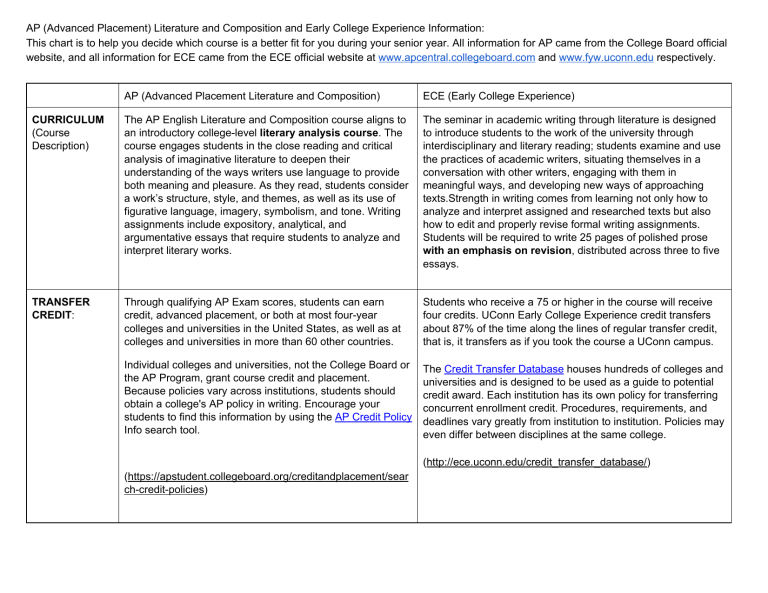AP (Advanced Placement) Literature and Composition and Early

AP (Advanced Placement) Literature and Composition and Early College Experience Information:
This chart is to help you decide which course is a better fit for you during your senior year. All information for AP came from the College Board official website, and all information for ECE came from the ECE official website at respectively.
AP (Advanced Placement Literature and Composition) ECE (Early College Experience)
CURRICULUM
(Course
Description)
The AP English Literature and Composition course aligns to an introductory collegelevel . The course engages students in the close reading and critical analysis of imaginative literature to deepen their understanding of the ways writers use language to provide both meaning and pleasure. As they read, students consider a work’s structure, style, and themes, as well as its use of figurative language, imagery, symbolism, and tone. Writing assignments include expository, analytical, and argumentative essays that require students to analyze and interpret literary works.
The seminar in academic writing through literature is designed to introduce students to the work of the university through interdisciplinary and literary reading; students examine and use the practices of academic writers, situating themselves in a conversation with other writers, engaging with them in meaningful ways, and developing new ways of approaching texts.Strength in writing comes from learning not only how to analyze and interpret assigned and researched texts but also how to edit and properly revise formal writing assignments.
Students will be required to write 25 pages of polished prose with an emphasis on revision essays.
TRANSFER
CREDIT
Through qualifying AP Exam scores, students can earn credit, advanced placement, or both at most fouryear colleges and universities in the United States, as well as at colleges and universities in more than 60 other countries.
Students who receive a 75 or higher in the course will receive four credits. UConn Early College Experience credit transfers about 87% of the time along the lines of regular transfer credit, that is, it transfers as if you took the course a UConn campus.
Individual colleges and universities, not the College Board or the AP Program, grant course credit and placement.
Because policies vary across institutions, students should obtain a college's AP policy in writing. Encourage your students to find this information by using the
Info
The houses hundreds of colleges and universities and is designed to be used as a guide to potential credit award. Each institution has its own policy for transferring concurrent enrollment credit. Procedures, requirements, and deadlines vary greatly from institution to institution. Policies may even differ between disciplines at the same college.
( )
( chcreditpolicies
AP (Advanced Placement) Literature and Composition and Early College Experience Information:
This chart is to help you decide which course is a better fit for you during your senior year. All information for AP came from the College Board official website, and all information for ECE came from the ECE official website at respectively.
COST:
$92*
For Students who participate in the Government
Subsidized Free/Reduced Lunch Program:
The College Board provides a $30 fee reduction for each exam taken by eligible students with financial need, depending on the student's state.
$160*
For Students who participate in the Government Subsidized
Free/Reduced Lunch Program:
UConn provides a fee waiver.
The same fourcredit course offered to nondegree students through the
Registrar
